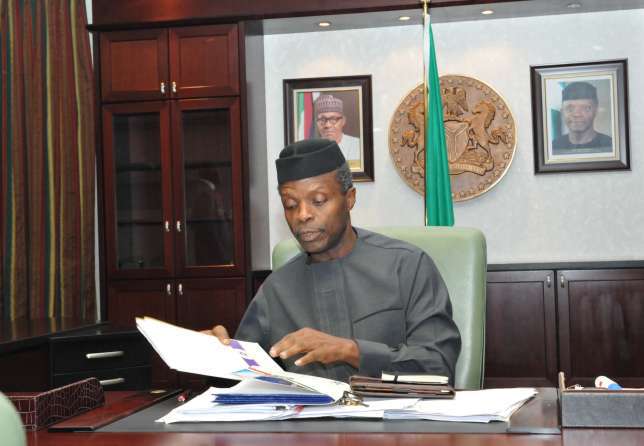• Tax Amnesty Still Available Till March, FG Tells Prominent Nigerians
The National Economic Council (NEC), chaired by Vice President Yemi Osinbajo, at its 9th regular meeting for the year on Thursday received the interim report on the forensic audit of revenue accrued from revenue generating agencies into the federation account, the excess crude account and consolidated revenue fund, which showed possible significant under-remittances from some of them.
Agencies indicted by the ad-hoc committee headed by former Accountant General of the Federation (AGF), now Gombe State governor, Alhaji Hassan Dankwambo, covered the period between 2010 and May 2015, include the Nigerian National Petroleum Corporation (NNPC), the Nigerian Maritime Administration and Safety Agency (NIMASA), and Federal Inland Revenue Service (FIRS).
Also among the 13 agencies on which forensic audit were completed are: Nigerian Petroleum Development Company, Department of Petroleum Resources (DPR), Nigerian Ports Authority (NPA).
A statement by ‘Laolu Akande, Senior Special Assistant to the President on Media & Publicity, Office of the Vice President, also revealed that while work is ongoing on the Nigerian Customs Service (NCS) and the Nigerian Communications Commission (NCC), the remaining three are not revenue generating.
The meeting “was also informed of questionable loans granted by some of the Revenue Generating Agencies.”
The committee was thereafter directed “to conclude its report under four weeks and fully report back to Council in the next meeting,” the statement noted, adding that a final report is to be submitted next month.
Also, Finance Minister, Mrs Kemi Adeosun, also informed the Council that a list of about 500 Nigerians with property and trusts abroad and who are believed to have under-declared their assets, has been obtained to determine their tax compliance status at home.
Such Nigerians, she said, can take advantage of the Voluntary Assets & Income Declaration Scheme (VAIDS), to settle past taxation defaults, adding that letters would soon be dispatched to such persons, including a number of prominent ones “asking them to take advantage of the tax amnesty in order to avoid prosecution and fines by simply paying up their tax defaults. The amnesty is available till March next year.”
The council was also assured that with the rate of progress in the VAIDS, “the target is likely to be met.
She also informed Council that the Federal Government recorded N89bn in Value Added Tax (VAT) revenue, the highest so far in the country in a single month in October 2017, and that the Federal Government is targeting N120bn on a monthly basis in the coming years.
The council also received a report from the committee on Export Promotion, chaired by Badaru Abubakar, Governor of Jigawa State, which recommended the establishment of a National Committee on Export Promotion, chaired at the Presidency level; in addition to a Technical Committee involving Federal and States MDAs to help provide technical information and direction to the proposed Committee.
Others recommendations of the committee included the streamlining of Export procedures and documentation; identification of existing domestic investors and engagement plan for output expansion; and establishment of more laboratories and testing centres to help improve quality and standard of export.
Others include: domestication of the Office of Technical Regulation (OTR) as recommended by UNIDO; deepening of Commercial diplomacy, one-stop shops for export and a National Export Portal to generate global orders to link suppliers to buyers of Nigerian products. To help enhance value Chain, the Committee recommended the development of clusters along product value chain, market driven research and development, and the provision of seeds and seedlings; recapitalization of NEXIM (Nigerian Export Import) Bank, the provision of Export Development Fund, in line with the Nigerian Export Promotion Council Act, a five-year financial window on export expansion grant and funding scheme for exporters similar to the CBN Anchor Borrowers programme.
The Ad-hoc Committee equally recommended a one-state-one-product approach based on comparative advantage for export drive; and establishment of State Committees on “Zero Oil Plan Implementation” with State Governors as Chairmen was also recommended.
Also briefing the council, Budget and Planning Minister, Senator Udoma Udo-Udoma said there are signs of economic recovery observed since Q3 2016 which consolidated in Q3 2017, with GDP doubling to 1.40%, with non-oil GDP increasing by 0.76% after growing in Q1, while the Services Sector remains in the negative; just as the Manufacturing Sector.
On budget support loan facility, the Accountant-General reported that approval has been received and CBN directed to pay N800m to 35 States of the Federation, following which the governors “expressed appreciation to the Federal Government for the restoration of the Budget Support Loan Facility for July and August, 2017.”
Also at the meeting, Dr. Mohammed Sani Haruna, Executive Vice Chairman/Chief Executive Officer, National Agency for Science and Engineering Infrastructure (NASENI) presented a home-grown “Solar-Powered Electronic Voting System” to effectively mitigate current electronic woes, replacing the “Card Reader” in the conduct of elections in the country.
The new proposed robust e-voting device, which has already been presented to Independent National Electoral Commission (INEC), after which it would be presented to the National Assembly, he said, will minimize human interference with the electoral process.








